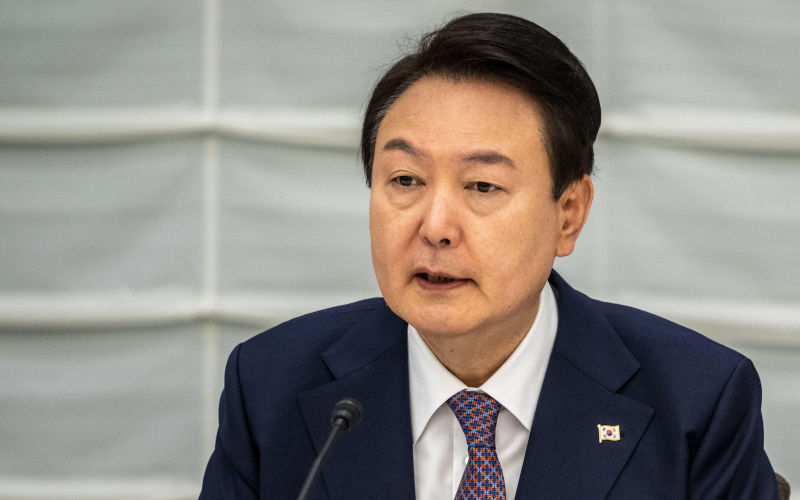A most severe national security law you will have never heard of
July 24, 2023
When it comes to a ‘pivot state’ in Asia against China, the security apparatus of South Koreas Yoon Suk-yeol is ignored or given a free pass by the West.
Tens of thousands protest in the streets, calling on their leader to resign and clashing with riot police. The government denounces them as stooges and spies; and promises to strengthen police, draw up tougher laws, restrict protests and crack down on the opposition and labour unions. Hundreds have been questioned, detained, charged or jailed for various opposition activities. A dictatorial national security law has been resorted to.
No, I am not talking about Hong Kong but South Korea ever since President Yoon Suk-yeol took office last May by winning an election with the flimsiest of margins. But you wont hear about any of that from the Western media because the country is a model democracy. More specifically, South Korea has become what Yoon calls a pivot state in Asia against China.
A former chief prosecutor, he has been called Koreas J. Edgar Hoover, the notorious first and longest-serving director of Americas FBI. During campaigning, he promised to create a republic of prosecutors.
Now, he has outdone himself by deploying not just card-carrying prosecutors, but state auditors, taxmen and yes, secret service agents against those perceived to be hostile to the state.
As reported by The Hankyoreh newspaper, It is becoming routine for the Yoon Suk-yeol administration to marshal prosecutors, the Board of Audit and Inspection, the National Tax Service, and the National Intelligence Service to act as spearheads of state operations.
Yoon and his administration have branded the previous administration, the main opposition party, labour unions, civic and social organisations, and the private education system as immoral and anathemas needing to be expelled, demonstrating the administrations reliance on inspection agencies. It has reached the point that Yoon has attacked the administration of his predecessor, Moon Jae-in, an anti-state force while criticising its policy on North Korea.
Yang Hoe-dong, an organiser for the Korean Construction Workers Union which was part of the targeted umbrella Korean Confederation of Trade Unions, was charged with extortion in several construction projects. To prove his innocence, he self-immolated on May Day. His death triggered several large-scale protests.
Then in June, to prove his innocence, Lee Jae-myung, leader of the opposition Democratic Party, voluntarily gave up his immunity from arrest as a legislator after allegedly suffering from sustained legal harassment. I give up the privilege of immunity from arrest regarding political investigations against me, he told the National Assembly, the countrys legislature.
For over a year since [his] inauguration, [President Yoon] has been fully mobilising the prosecution and the police to manufacture crimes [I] did not commit, exhausting national resources to cajole and blackmail those involved. The prosecution has conducted over 300 searches and seizures with me as the target.
South Koreas national security law, which dates back to the era of anti-communist dictatorships, has been described by legal scholars as among the most draconian in the world. You may not have heard of it. Instead, not a week passes without negative coverage of Hong Kongs national security legislation.
But Seouls is even more severe and many of its offences more vague. You can get: seven years for praising, encouraging, disseminating, cooperating with anti-state groups; two years for spreading anti-state rumours or propaganda; life, death or five-to-10-year sentences depending on the severity of anti-state acts committed by members of anti-state groups; up to 10 years for communicating with anti-state groups; and up to five years and a fine of 2 million won (HK$12,395) for failing to inform on anti-state activities.
With an approval rating of 39 per cent, its not just about his crackdown against opposition and labour, but his pivoting with Japan and the United States against China. To tilt towards Tokyo, Yoon has to betray the memory and legacy of comfort women. To work with Washington, he has turned his country into an even greater military asset for the US.
He can do no wrong because he is a trusted friend in Asia.
First published in the South China Morning Post on July 19, 2023

